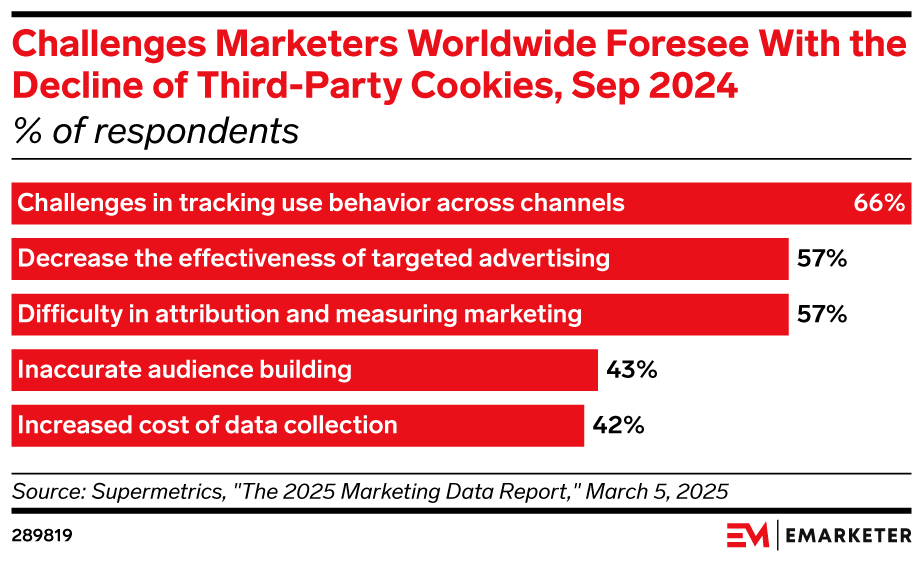The search engine giant will no longer be removing third-party cookies on Chrome. Find out how this will impact advertisers and industries.
After years of back-and-forth, Google has now officially pulled the plug on its plan to deprecate third-party cookies in Chrome.
In a shocking twist, Google officially released a statement in mid-April 2025, announcing that they have now scrapped their plans for their supposed changes to third-party cookies in Chrome along with how their Privacy Sandbox initiative is gonna go about moving forward.
Next steps for Privacy Sandbox and tracking in Chrome
Anthony Sanchez, the VP of Privacy Sandbox of Google, has stated that the company decided “to maintain our current approach to offering users third-party cookie choice in Chrome.” and they “will not be rolling out a new standalone prompt for third-party cookies”.
The move comes as a result of industry and regulatory pushback, citing criticisms and regulatory concerns from publishers and developers to regulators and advertisers worldwide. As Sanchez himself put it: “It remains clear that there are divergent perspectives on making changes that could impact the availability of third-party cookies”.
Furthermore, Google mentioned that the ever-evolving landscape has drastically changed since their Privacy Sandbox was first introduced back in 2019. This includes higher adoption of privacy-enhancing technologies, new AI opportunities to safeguard and secure people’s browsing experiences, and the regulatory landscape around the world evolving considerably.
Not to mention the involvement of the UK’s Competition and Markets Authority (CMA) and the Information Commissioner’s Office (ICO) has been affecting Google’s plans of rolling out their supposed tracking changes, leading to a lot of back-and-forth delays from the search engine giant.
All of these factors have ultimately led to Google’s decision to maintain the status quo on third-party cookies in their platform.
That said, Google will continue to enhance tracking protections in Chrome’s Incognito mode (which already blocks third-party cookies by default). Users can continue to choose the best option for themselves in Chrome’s Privacy and Security settings.
Moreover, Google will continue to invest in technologies that will ensure data privacy and security for Chrome users. These include an IP Protection feature that is set to launch sometime in Q3 2025, as well as Safe Browsing and Safety Check. Other features they plan to launch include built-in password protections and AI-powered security protections.
What this means for advertisers and the world of ad tech
This isn’t the end of the Privacy Sandbox initiative by Google. The company stated that it will continue to explore the use of Privacy Sandbox APIs in the coming months for those who still want to take advantage of this initiative.
However, for those advertisers and ad tech companies who haven’t taken advantage of shifting to cookieless marketing yet, they may breathe a temporary sigh of relief. This gives them some time and, more importantly, an opportunity to finally make the switch to a more foolproof plan before the next privacy reform happens.
While this announcement by Google does finally address our question on whether cookies will be on the menu for 2025, marketers should avoid complacency. Advertisers should continue to invest and look more into first-party data, contextual targeting, and measurement frameworks that don’t rely on third-party cookies.
Moreover, there are still numerous pressing challenges marketers are worried about should third-party cookies decline. A recent study by eMarketer, back in March 2025, found that there are still various issues that will be heightened as the digital landscape evolves to a more cookieless future:

This shouldn’t be treated as “problems we no longer need to be worried about,” but rather, things we still need to constantly address and work on should the worst-case scenario happen.
And while some industry players see this as a way to appease regulators and as a way to extend an olive branch to them, especially after recently losing three antitrust cases, numerous companies in the industry have expressed their frustration.
The magnitude of the collective effort dedicated to evaluating Google’s Privacy Sandbox proposals in recent years is immense, with some noting that countless millions of hours and dollars have been spent by companies in anticipation—much of it ultimately in vain.
We shall see how the ad tech world gets impacted by this news. But as more and more concerns arise, especially when it comes to data and user privacy, we expect advertisers to continuously search and invest in alternatives to third-party cookie solutions.

To see more from illumin and our partners, be sure to follow us on X and LinkedIn where we share interesting news and insights from the worlds of AdTech and advertising.











